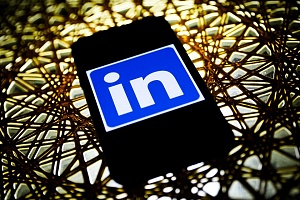
Today, my first phone call was from an over 50 year old who asked if she really needs a LinkedIn profile? She was not job hunting, and she didn’t realize that employees, customers, clients, and other colleagues might be checking her out. “Oh no,” she replied. “No one will be impressed if they see what I have up. I haven’t updated it in years.”
She was mistaken to think only job hunters use LinkedIn. However, US News reports that 95% of recruiters use LinkedIn to find and evaluate job candidates. It seems everybody is using this professional network. One of the best things you can do for your career is to have a terrific LinkedIn profile. These 17 useful tips will help you create a profile that will impress others.
Headline
By default, your current job title will show as your headline. That is not what you want. This heavily searched section should focus on what you do. State the work title you qualify for, do now, or want. Be specific using standard titles that are typically found on a job search site. You can highlight the field you are interested in, plus any specialties or key certifications that you possess
Job Titles
Your profile headline and job titles are weighted heavily in LinkedIn’s search algorithms. State the most accurate name for what you do to clarify to a reader if your formal title isn’t clear. For example, “Tech 3” might be the internal title, but “Network Engineer” is the actual work you do, so you would want to use that instead. You have 100 characters available so add anything distinctive, example: Product Manager – Global Emerging Countries
Ready to up your LinkedIn game?
Your Profile picture
This is a vital part of your personal brand. Make sure you have an updated photo that is not more than one year old. The image should be a headshot with a plain, neutral background. You want good lighting on your face and SMILE! Your photo should make you look warm and engaging. See my article “LinkedIn Photo Tips To Look Your Best” for more details.
Keywords
You need to display a distinct skill set, noting your key strengths and accomplishments. You must create the right keywords if you want LinkedIn to be an effective tool for you. Peruse current job openings that you are a fit for and note the critical skills and experiences they want. Identify 5-10 typical job tasks you perform and list these keyword job skills deemed imperative to perform the job. Make sure you pepper these keywords throughout your profile.
Work Experience
Do not describe the company you work for. Focus on what you do for them. Avoid long, generic job descriptions. Add measurable results and a few accomplishments. Distinguish how you have cut costs, developed or created something new, added to the sales revenues, enhanced productivity, note any important process/system/organizational improvements you have made.
Recommendations
These mini references are powerfully effective. Be sure you have at least five recommendations – more is better. Ask a few bosses, clients, or colleagues to write one for you. You increase your chances that they will comply if you ask and offer a few sentences on what you would like them to mention. The easier you make it for your connection to post a recommendation, the higher the probability they will do it.
Summary/About section
LinkedIn recommends this be a personalized section that shows your personality and is written in FIRST PERSON. Here you tell people about what kind of work you do, what you feel you are good at, and what type of work tasks you enjoy. You can also discuss why you like your field or job. Consider mentioning what a boss says you are good at or what clients like about working with you. Keep it all genuine and authentic. Think of it as a personal communication if you were networking in person and what might you say about yourself. Above all, avoid resume speak. You do not want this to look like something you pulled off your resume or a bio about yourself.
Make connections
LinkedIn advises you to connect with 300-500 individuals that you know to have a good network. The more common connections you have with any searcher (recruiter, hiring manager, prospective client, etc.), the higher your profile will be in their results when they search words relevant to your profile.
Skills
Review what you have. Update and add any new skills and remove old ones to this section.
FOR JOB HUNTERS:
Open to Work/New Job
Let recruiters on LinkedIn know you’re open to new job opportunities by turning on this section seen only by Recruiters unless you use the “OPEN to WORK” tag (which I don’t recommend displaying). You can specify up to 5 job titles that you are interested in and your preferred location. LinkedIn does an excellent job shielding you from your current company’s recruiters. They take steps to prevent LinkedIn Recruiter users who work at your company and related companies from seeing your shared career interests, although they don’t guarantee it.
+ Location
Recruiters often begin to look for candidates by searching job title and location. On the “Let Recruiters Know you are Open to Work,” you can select up to 5 locations. Use cities, not small towns. Listing states are a good option too. Many recruiters say that they are looking for candidates who are likely to accept the job offer.
+ Remote Work desired
Employers have many people working remotely now, so you can designate this under the “Let Recruiters Know you are Open to Work” section and broaden your job opportunities.
Contact info
Add a phone number since recruiters like to call or text prospects. Include your personal email, one that you often check, as this is essential. You may have set up LinkedIn using an old or work email. Go into your settings and update it to a personal email that is currently active so you won’t miss an employer trying to contact you.
Post, comment, use hashtags
Be visible on LinkedIn. Many recruiters and HR folks monitor hashtags and conduct content searches looking for the movers and shakers in the industry they are sourcing.
By posting quality content and including appropriate industry-related hashtags, you are putting yourself out there as an expert, and you may get noticed and found in an entirely different way.
Connect to recruiters on LinkedIn
Chances are, some recruiters specialize in your industry. Make sure you know who they are and that they know you. The easiest way to do this is to conduct a search on LinkedIn for recruiters that source talent for your industry. Use LinkedIn’s search box designating PEOPLE, and type “Recruiter AND [the name of your industry].” Scroll through the results and click on profiles that look interesting. When you find a match, send the recruiter a PERSONALIZED MESSAGE (no resume) with the connection request.
Open to PUBLIC
Under the small picture of your face, in the drop-down menu, you set privacy settings. Some HR and smaller employers do not use LinkedIn recruiter due to the cost. Opening your Profile up allows anyone searching using Google (etc.) to find you.
Complete education info
If you earned a degree, you must add in the graduation date, or the employer/HR or Recruiter may think you only attended college but did not finish.
MORE HELP on Creating Your Profile
For in-depth direction and specifics on creating your LinkedIn Profile, I invite you to register for my free LinkedIn Profile Creation Guide.
This article was original published in Forbes Magazine.


